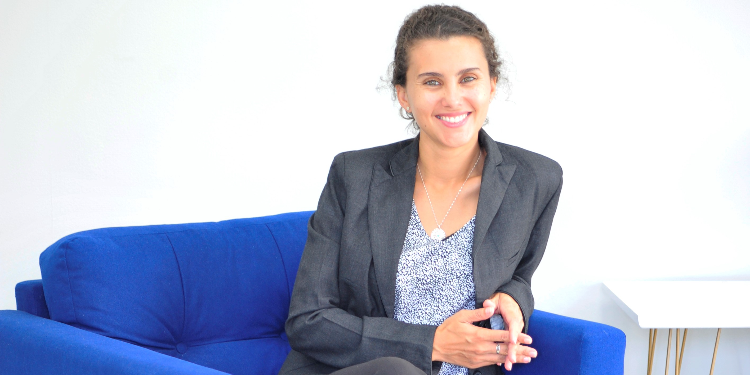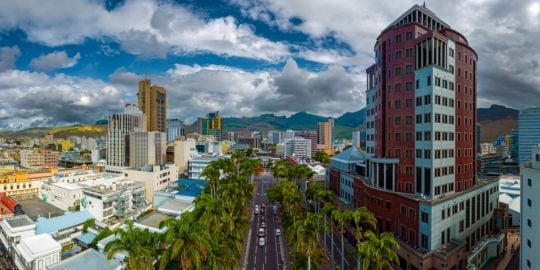Can you introduce yourself and tell us more about you?
I am a 34-year-old mother of two, aged 6 and 8, and am originally from the north of France by my father and from the island of Grande Comore by my mother.
I have a strong African and Indian-ocean background, having grown up in Chad until the age of 4, in Madagascar till the age of 12, and in Cameroon until 15, with very frequent trips to the Comoros Islands during this period. I then went to high school and college in France, near Paris.
I started my career at Accenture in 2010, where I worked on the standardization of Information Systems for the ministries in Paris and then quite quickly integrated an Airbus Carve-Out project (creation of a new autonomous company from a department) in Toulouse.
I have been a consultant for 7 years, working on Airbus Business Transformation projects in Manufacturing Engineering, Production, Procurement and Testing.
In 2018, I joined the group internally as an IT M&A Project Leader in the department where I was first assigned. This brought me full circle, and I was able to explore other facets of the business, working with the CIOs of some of the subsidiaries, including ATR.
Moving to Mauritius, I left the company and took the opportunity of this transition period to train as a Professional Coach with a specialty in Team Coaching based on NLP (Neuro-Linguistic Programming). I started my own business here in early 2022 and tested the market across different activities until my offer turned out to be what it is today.
Currently, my working week is split between Transformation Project Management and Team Coaching with startups, SMEs, or large enterprises. I'm also strongly involved in entrepreneurship-related associative networks.
Other than that, I am a member of Komlink, a community of 80 entrepreneurs from the Comorian diaspora that has the spirit, dynamics, and internal structure of a startup. I am also Co-President of French Tech Mauritius, along with Nicolas Goldstein.
Why Mauritius?
My family and I landed in Mauritius in August 2021. We had been looking to move to the Indian Ocean for a while. We wanted to experience life abroad while bringing our children closer to their grandparents who live in the Comoros and Reunion Islands, where my husband was born and raised.
Mauritius offers a gorgeous living environment and a tropical climate that I wanted to experience again. On top of that, there is also a high-quality French school system for the children, with better enhanced English classes as compared to schools in France. In addition, there's a decent healthcare system here. The last important factor, and not the least, is the economic environment, which we believe is very favorable for entrepreneurship.
When we decided to move from Toulouse, both my husband and I quit our jobs. We sold our house and almost everything in it, then took a one-way ticket to the Indian Ocean. We had to aim for the safest possible landing ground for this so-to-say tandem skydive. We are happy with our choice of Mauritius!
Tell us about your professional activity. Is there a significant demand for this type of service in Mauritius and in the African/Indian Ocean region?
The mission of my company, IO Corporate Development, is centered on collective performance and consists of two parts.
I mainly help large companies to structure and carry out their transformation projects under optimum conditions. And on another level, I accompany teams, startups, SMEs, or corporate teams through team coaching. In this case, the goal is to offer them precious space-time in a caring way, with the aim of consolidating the team's base and making them work in collaborative mode.
I love to combine coaching tools with grassroots aspects of companies that can be very effective. My medium-term goal is to expand my scope of action towards the development of a significant regional footprint, through local partnerships on the various islands, then in South-East Africa. I wish to work as much as possible on projects with a positive impact on sustainable development (socio-economic and environmental).
I must say that there is indeed a demand for topics related to collective performance here.
There is also significant demand in terms of transformation projects, given the economic development pace of the island and its companies. In addition, there are sustainable development challenges that require very practical integration into development strategies.
When it comes to team coaching, the difficulty of retaining talent is a major challenge on the island. The goal of federating teams can not only be achieved through fun Team Building events but it can also be realized through one or two sessions of intense work on specific topics or strengths. Moreover, these sessions can address specific issues that the team doesn't often have the opportunity to discuss.
As for the demand in the region and in Africa, I believe that it is particularly strong among startups and small structures. My contribution can be particularly valuable in laying solid foundations. It can help them design ways to execute their big projects and build balanced, strong and fully active teams that are not only co-responsible for the development of their businesses but also fully empowered to implement their growth strategy.
What are your views on the entrepreneurial environment in Mauritius and in the region with regard to your experience in large international companies? How does it differ?
As a rule of thumb, it is important not to compare different ecosystems with each other but focus on how they can benefit each other and the people who make up the said ecosystems.
One key point, for example, is how well the ecosystem enables and encourages entrepreneurship. On this point, the country is implementing various measures to encourage entrepreneurship while ensuring that the offer from foreign companies complements and enriches the local proposal instead of competing with it.
Then, there is the number and quality of the systems available to promote innovative entrepreneurship: instances like incubators, events, support programs, and competitions, which allow young people who wish to explore this path to do so in good conditions.
Other than that, the market size is an essential factor to consider in Mauritius. It is a rather limited market with strong disparities in purchasing power, even within the B2B sector. Therefore, a company that aims for strong growth will have to readily target international customers straight at the start-up stage.
Let's talk about women's entrepreneurship in the region. Have you noticed a strong interest from the public? Is the entrepreneurial ecosystem in the region favorable to women entrepreneurs?
To my knowledge, starting a business as a woman in Mauritius is no more complicated than for a man. In fact, most of the time, women entrepreneurs are self-employed or head of small businesses, which is already very good. This can be deemed enough to create inspiring role models for young girls, but there is still a socio-cultural context where more work needs to be done in terms of gender equality.
Various initiatives and networks exist to bridge this gap. There are even events dedicated to women entrepreneurs and women in Tech. At French Tech Mauritius, we are in the process of planning partnerships with some of these networks/events because we want to inspire young girls and women to create innovative tech projects.
What are, in your opinion, the essential qualities and skills required to thrive as an expat entrepreneur in Mauritius and in the African / Indian Ocean region?
When you are an expatriate, I believe the first thing is humility.
You do arrive with expertise, of course, but in the host country, you also have skilled people, experts on many different subjects, with whom you have to co-create if you want to get the best out of your projects and businesses.
Open-mindedness will be the second quality. Intercultural differences being what they are, it's no use grumbling about these differences. It just consumes energy that can be better spent elsewhere.
The ability to create links is another precious asset, as companies are first and foremost managed by men and women, and that the regional/international network is often tighter than one might expect.
And finally, one should never neglect the quality of work and integrity, which are fundamental to prosperity.
In this tight ecosystem, word-of-mouth and recommendations are the most effective marketing channels. But these same channels carry bad experiences at the same speed. Hence the importance of offering real value and being ready to meet and interact with your customer at any time in the supermarket aisle!
How important is coaching for startups and larger companies, in general?
I have provided individual coaching to startups in different fields and at different stages of their creation. What I have observed is that, in addition to the typical entrepreneur's feeling of isolation and sometimes the imposter syndrome, they experience the sensation of endless work on every front and of having lost the guiding thread along the way.
When faced with these feelings that can block the process of creating, delivering, and thinking, coaching first calms things down, puts things back in order, and reconnects with the why, the genesis and the vision. It allows the entrepreneur to gain back confidence in himself and in his project to reassert a positive perspective.
When the person is rebooted, we can define, redefine, and/or clarify the objective and help him/her build an action plan that he/she feels perfectly capable of carrying out safely.
For startups made up of small teams, the work will be more focused on defining a foundation that is consistent with everyone's values, on defining the core of the startup, on aligning the team members with a vision and a common direction in which everyone feels comfortable with their "hard or soft skills".
It is also a moment when roles and responsibilities can be clarified, and "gaps" can be identified, either in terms of functionality, or in terms of skills, or even in terms of personality. At the end of the day, the aim is to ensure complementarity in the team.
Finally, it is a precious moment when, outside of any highly emotional situation, they will be able to establish principles of collaboration to avoid future conflicts as much as possible and to face external challenges as a block.
All these elements allow entrepreneurs and their teams to take up challenges, knowing that the road will not necessarily be easy. The goal is to go as one and put all the chances on their side to maintain the course they have defined!
Do you have any advice for people who would like to start a business in Mauritius or in the African/Indian Ocean region?
Just go for it! The Indian Ocean and Africa are real lands of opportunities, but you will need to surround yourself with experts and interact with one or more peer networks. In Mauritius, the CCI France-Mauritius is a good point of entry for companies with a link to France. And French Tech Mauritius is another good one, of course, for those related to innovation and Tech.

















Contact us to be featured in the Interviews section.
Participate